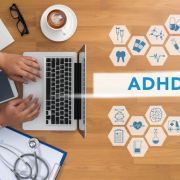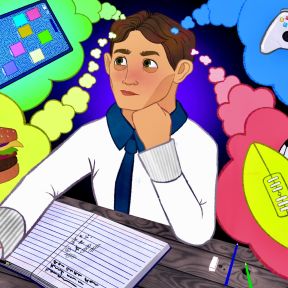What Is ADHD?
Attention-deficit/hyperactivity disorder (previously known as attention deficit disorder or ADD) is a neurobehavioral disorder characterized by core symptoms of inattentiveness, distractibility, hyperactivity, and impulsivity. ADHD is thought to be the most common childhood mental health disorder, with estimates of its prevalence in children ranging from 5 to 11 percent. ADHD in adulthood is thought to be less common, with approximately 2 to 5 percent of adults diagnosed.
ADHD symptoms can interfere with work, school, household tasks, and relationships, and managing the disorder can be a challenge for both children and adults. Fortunately, there are treatments that have been shown to be effective, and anyone affected by ADHD can learn coping skills to work around struggles and harness their talents—as many successful individuals with ADHD have already done.
On This Page
- What does ADHD look like?
- Is ADHD real?
- What causes ADHD?
- How is ADHD treated?
- Is ADHD genetic?
- Is ADHD a disease of modernity?
- Is ADHD a disability?
- Is ADHD a learning disability?
- I feel fidgety all the time. Do I have ADHD?
- How can I best help my child manage his ADHD?
- Is ADHD good or bad for romantic relationships?

Some children and adults with ADHD find it difficult to concentrate on tasks at school or work and may daydream frequently. Children with ADHD may become disruptive, defiant, or have trouble getting along with parents, peers, or teachers. Children who struggle with hyperactivity and impulsivity, in particular, often have behavioral challenges that can be difficult for adults to manage.
Adults, on the other hand, may be more likely to report feeling restless or fidgety; if they struggle with impulsivity, they may make rash decisions that adversely affect their life. For both children and adults, executive functioning (planning, emotional regulation, and decision-making) is often affected as well. Many children and adults display either hyperactive or inattentive symptoms of ADHD, but it’s also possible for both sets of symptoms to exist together, in what is typically called combined type ADHD.
For more on symptoms, see ADHD Symptoms and Diagnosis.

Most psychiatrists and psychologists agree that ADHD is real. It runs in families (suggesting genetic roots) and neurological evidence has found it to be associated with alterations in brain growth and development. ADHD is also clearly linked to academic, work, and relationship problems—and responds to treatment—suggesting that it has clinical validity. But whether the disorder is overdiagnosed and overtreated—or whether it reflects a set of evolved traits that have become less adaptive in today’s world—is widely debated.
For more on the biology of ADHD, see Causes and Risk Factors in ADHD.

Like many other mental health disorders, the causes of ADHD remain under investigation. Genes are theorized to play a key role, as are environmental influences such as exposure to toxins in the womb and early traumatic experiences. Since ADHD is a behavioral disorder, expectations of appropriate behavior, particularly in children, likely influence diagnoses in some cases.
For more on the causes of ADHD, see Causes and Risk Factors in ADHD.

Experts have debated whether treatment for ADHD should be primarily behavioral (therapy, attention training, increased play, greater structure) or pharmacological. Several large studies have concluded that a combination of both may be most effective.
For more on treatment options, see Treatment of ADHD.

Significant evidence suggests that ADHD has both genetic and environmental underpinnings. Twin studies, for instance, have found that identical twins are significantly more likely than fraternal twins to both be diagnosed with ADHD or display ADHD-like behaviors. There is no single gene that is considered “responsible” for ADHD; rather, like many psychiatric conditions, it is thought to be linked to many genetic variants, only some of which have been uncovered.
For more on genes and other factors that may lead to ADHD, see Causes and Risk Factors in ADHD.

Some experts argue that what we call ADHD is actually a “disease of civilization”—that is, a disorder that arises because of a mismatch between humans’ evolutionary roots and our modern environment. High energy levels, for instance, may have been adaptive for a hunter-gatherer but are problematic in a modern classroom. Some prominent child development experts have noted that the recent rise in ADHD diagnoses has coincided with an increased focus (particularly in American schools) on rigorous standardized testing and reduced playtime—suggesting that at least some children diagnosed with ADHD have been placed in environments that worsen the evolutionary mismatch.
For more on living with ADHD in the modern world, see Daily Management of ADHD.

It depends. Under both the Americans with Disabilities Act (ADA) and the Individuals with Disabilities Education Act (IDEA), ADHD can be legally considered a disability in some cases. But a diagnosis alone isn’t enough to qualify for protection under the law. In addition to a formal diagnosis, the individual (and/or their parent, if in an academic setting) must also establish that symptoms substantially limit functioning. If such limitations can be adequately documented, reasonable accommodations must be provided by the employer or the school (if it is public).
For more on accommodations, see ADHD at School or ADHD in the Workplace.

Though ADHD can and often does cause academic challenges, it is not considered a specific learning disability (such as dyslexia or dysgraphia). However, many children with ADHD—anywhere from 30 to 50 percent, according to some estimates—have a comorbid learning disability. The conditions can also display similar external symptoms, particularly in children.
For more on distinguishing ADHD from learning disabilities and other disorders, see ADHD and Related Conditions.

While fidgetiness is certainly an aspect of ADHD, the condition is more complex than physical restlessness. If, in addition to constant fidgetiness, you experience strong feelings of distractibility that persist in multiple settings, often behave impulsively, talk excessively, struggle to follow through on tasks or manage your time, and/or make careless mistakes on important projects, you may show symptoms of ADHD. Requesting an evaluation from a healthcare provider is the first step to receiving a diagnosis and initiating treatment.
For more about symptoms and diagnosis, see ADHD Symptoms and Diagnosis.

All children benefit from love, structure, and consistency; children with ADHD need all three in droves. Since ADHD symptoms and their resulting academic and social challenges can be damaging to a child’s self-esteem, parents should take steps to find a treatment that works, help the child identify his strengths, and advocate for his needs as he learns to navigate the world on his own. Parents should also help the child set up routines, identify academic strategies that address her specific needs, and learn the social skills necessary in order to form lasting friendships.
For more about raising a happy and healthy ADHD child, see Parenting a Child with ADHD.

There is no single way that ADHD affects romantic relationships, and the condition often comes with both positives and negatives. Many couples, for instance, find that one partner’s ADHD (or both, in some cases) enhances the relationship by making it more spontaneous or sexually fulfilling. Others, however, find that symptoms of distraction, disorganization, or impulsivity can lead to frustrating miscommunications between partners or trigger arguments.
Both partners—regardless of their own ADHD status—should be honest about any challenges that ADHD brings to the relationship, while also making an effort to appreciate its upsides whenever possible. Having compassion toward one’s partner is critical for making any ADHD relationship work.
For more on love and ADHD, see ADHD and Relationships.














